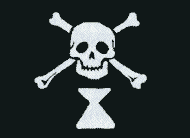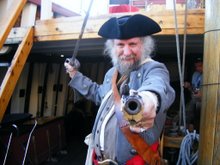While at Opsail 2012, I heard three completely different mistakes about the origins of words or phrases. There is a lesson to be learned here.
The first one came from a group representing the "World of 1812". There was a display of military items and someone asked if a piece was a carbine? A costumed boy in his late teens said, 'no, it was a musket.'
I looked at the piece and pointed out that it was carbine length. This was easy to verify because the display included a full musket. The boy confidently claimed that they called everything a musket, regardless of the length and that carbines did not exist until rifles were invented.
It so happens that I had looked up carbines recently and I know that the word goes back 200 years before 1812 (1590 to be exact). I mentioned that I have a 1640s carbine and I think he got the idea that I knew what I was talking about. At least he stopped arguing.
There were two problems here. The first is that you have to be very careful about your source material when you start arguing with the public. They have the world at their fingertips. I could easily have used my smartphone to show him that the gun in question is sold as a "1809 marine carbine" or have shown him the Wikipedia entry on carbines.
The other problem is that you should not assume that wearing a costume makes you an expert.
The next myth was much worse because of its source. The Bounty had a display of the mess area with signs above that offered information. One of them said that sailors used their elbows to keep their food from sliding around. Sailors were prime candidates for press gangs on shore so anyone who ate with his elbows on the table was at risk of being pressed.
It doesn't take a minute to debunk this. Just try eating while holding your plate still with your elbows. You can't do it.
The admonition against elbows on the table was referring to people who bent over their food, supporting themselves with their elbows and shoveled the food into their mouths. The idea is that you should sit up straight, supported by your back instead of your elbows. This is an example of trying to attribute a nautical explanation to everyday things.
Since this was on an official sign, the Bounty has no excuse.
The last example has nothing to do with Opsail. It just happened to come at the same time. A trivia slide on Pawn Stars said that "Mind your Ps and Qs" refers to the tab that a sailor would have with the ship and referred to quarts and pints.
I have heard the quarts and pints explanation before. Attributing it to ships is new.
The expression itself should be taken at face value. The letters P and Q look similar and "Mind your Ps and Qs" is a warning to be extra careful. The part about the bar tab just adds a little to the explanation. It is still based on the two looking alike. This is making a simple explanation more complicated. The part about it being the tab on a ship is an example of attributing everything to a nautical origin.
Note, you can make a strong case for it coming from printers since type is backwards which makes it easy to mix up the two.
The moral of all of this is to check your sources, don't needlessly complicate things, and remember that a story that is too good to be true probably is false.
Subscribe to:
Post Comments (Atom)


No comments:
Post a Comment